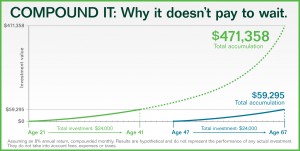 There are 5 reasons not to contribute to your Retirement Plan, however always have a plan for how you will survive financially in retirement. Many people may find this amazing, but there are some good reasons why you should not contribute to your retirement fund in the opinion of the writer. Give it some thought and then make your own decision. You may also want to chat with some other people such as your family or your investment adviser or banker. It should be someone who will give you an unbiased opinion.
There are 5 reasons not to contribute to your Retirement Plan, however always have a plan for how you will survive financially in retirement. Many people may find this amazing, but there are some good reasons why you should not contribute to your retirement fund in the opinion of the writer. Give it some thought and then make your own decision. You may also want to chat with some other people such as your family or your investment adviser or banker. It should be someone who will give you an unbiased opinion.
If you do not invest in your retirement because one or more of the reasons below apply to you, make sure that you solve these issues and then get started investing in your retirement. You do not want to end up retiring with no retirement fund. It is very important to save for retirement, but sometimes in the short term there are more important issues to resolve.
5 reasons not to contribute to your Retirement Plan or
No emergency fund.
Everyone should have an emergency fund to get you through those times when you are not working for any reason whether it is because you have been laid off or have health issues. An emergency may also include a major emergency repair, it may include a major health issue or some other thing that you really need to have an emergency fund for. Once you have at least 6 months of take home pay saved up, then you can look at some other issues such as retirement savings.
No match in contributions to your Retirement Plan from employer.
Many employers will match contributions as an additional benefit and also as an incentive for employees to save for their retirement. If your employer does this then you definitely want to take advantage of it. If they do not have such a program then there is no incentive to participate in this particular program other than perhaps convenience. However most advisers would recommend that you keep your retirement savings independent of your employer.
You are swimming in debt.
Paying off your debt especially high interest debt can save you a great deal of money. If your loan is 10% interest, then when you pay off this loan you are reducing the interest that you pay and effectively paying yourself 10% in interest savings. Right now you cannot even come close to that level of income on any investments that are safe enough for a retirement account.
You are afraid of future tax increases.
If you are expecting your income to rise over time, you may not want to avoid putting money in a retirement fund. This applies when withdraw it later and you are in a higher tax bracket. This probably does not apply to too many people.
High management fees.
Look for plans that have low management fees. If your current plan has a lot of management fees you may want to consider investing elsewhere . This is a decision that you need to discuss with your investment adviser.



